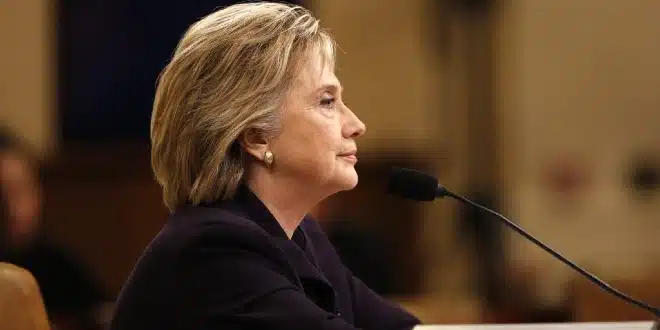A new report has once again placed former U.S. Secretary of State Hillary Clinton under public and political scrutiny. This time, the criticism stems from claims that the FBI fell short in properly investigating Clinton’s use of a private email server and her alleged mishandling of classified material during her tenure in the Obama administration.
Republican Senator Chuck Grassley recently obtained what’s being referred to as the “Clinton annex” — an appendix to the Department of Justice Office of the Inspector General’s (DOJ OIG) report. Grassley criticized the FBI’s actions in strong terms, stating the agency demonstrated “an extreme lack of effort and due diligence” in its investigation of Clinton’s email practices.
Allegations of Negligence and Political Bias Within the FBI
Senator Grassley specifically targeted the leadership of former FBI Director James Comey, accusing the Bureau under his command of intentionally avoiding key lines of inquiry.
“Under Comey’s leadership,” Grassley said, “the FBI failed to perform fundamental investigative work and left key pieces of evidence on the cutting room floor.” He contrasted this with what he called the FBI’s “full-throated” pursuit of the Trump-Russia investigation, which was partially built on the controversial and later discredited Steele dossier.
According to Grassley, the disparity in how the two cases were handled suggests that political considerations may have influenced the FBI’s decision-making.
Grassley’s statements come shortly after former Congresswoman Tulsi Gabbard — who has aligned herself more with conservative voices in recent years — echoed similar sentiments. She alleged that the Obama administration played a central role in fabricating the Trump-Russia narrative, framing it as a political maneuver designed to undermine then-candidate Donald Trump.
Missed Opportunities and Unexplored Evidence
The Clinton annex outlines a series of significant investigative gaps. Most notably, it reveals that the FBI came into possession of thumb drives believed to contain highly sensitive government data. Despite this, senior FBI officials — including Comey, then-Deputy Director Andrew McCabe, and former Special Agent Peter Strzok — reportedly failed to carry out recommended, targeted searches of these drives.
The annex indicates that the thumb drives included data from various U.S. government agencies such as the Department of State, along with emails associated with then-President Barack Obama and potentially even materials involving Congress. The DOJ OIG noted that the drives represented a potential national security concern and should have been prioritized for analysis, including for signs of foreign intelligence activity. However, that review never took place.
In addition to the thumb drives, the FBI reportedly received intelligence reports hinting at communications between then-DNC Chair Debbie Wasserman Schultz and individuals tied to the Soros-backed Open Society Foundations. These reports alleged that the Obama administration may have acted to hinder the Clinton investigation, possibly to shield her 2016 presidential campaign. Yet, according to the annex, the FBI made little to no effort to verify the credibility of these claims.
Timeline of Events Raises Further Questions
The FBI’s handling of the Clinton case has long drawn criticism, but the annex sheds new light on how decisions were made at key moments. On July 5, 2016, Comey made a public statement effectively clearing Clinton of criminal wrongdoing and advising the Department of Justice not to pursue charges. According to Grassley’s oversight findings, Comey had already prepared to exonerate Clinton before she was interviewed by investigators — a move some see as indicative of bias.
Then, just weeks later on July 31, the FBI initiated the now-debunked Crossfire Hurricane investigation into alleged ties between Trump’s campaign and Russia. Text messages from that same day between Peter Strzok and FBI attorney Lisa Page suggest the agents saw this new probe as weightier than the Clinton case. “This matters because this MATTERS,” Strzok wrote, highlighting what many critics view as the agency’s selective application of investigative intensity.
Fallout and Broader Implications
Grassley concluded that Comey’s actions in the Clinton investigation revealed a lack of impartiality and professionalism, ultimately justifying his removal as FBI Director by President Trump in 2017. The Clinton annex has added new fuel to long-standing debates about the politicization of federal agencies and the uneven application of justice.
While the allegations do not present new legal charges against Clinton, they revive concerns about how classified material was handled, the role of high-ranking officials in suppressing potentially damaging evidence, and whether political motivations shaped the FBI’s decisions in 2016 — a pivotal election year.
As public trust in institutions like the FBI remains fragile, this latest report is likely to deepen partisan divides and reinvigorate demands for further oversight and reform within federal investigative bodies.


